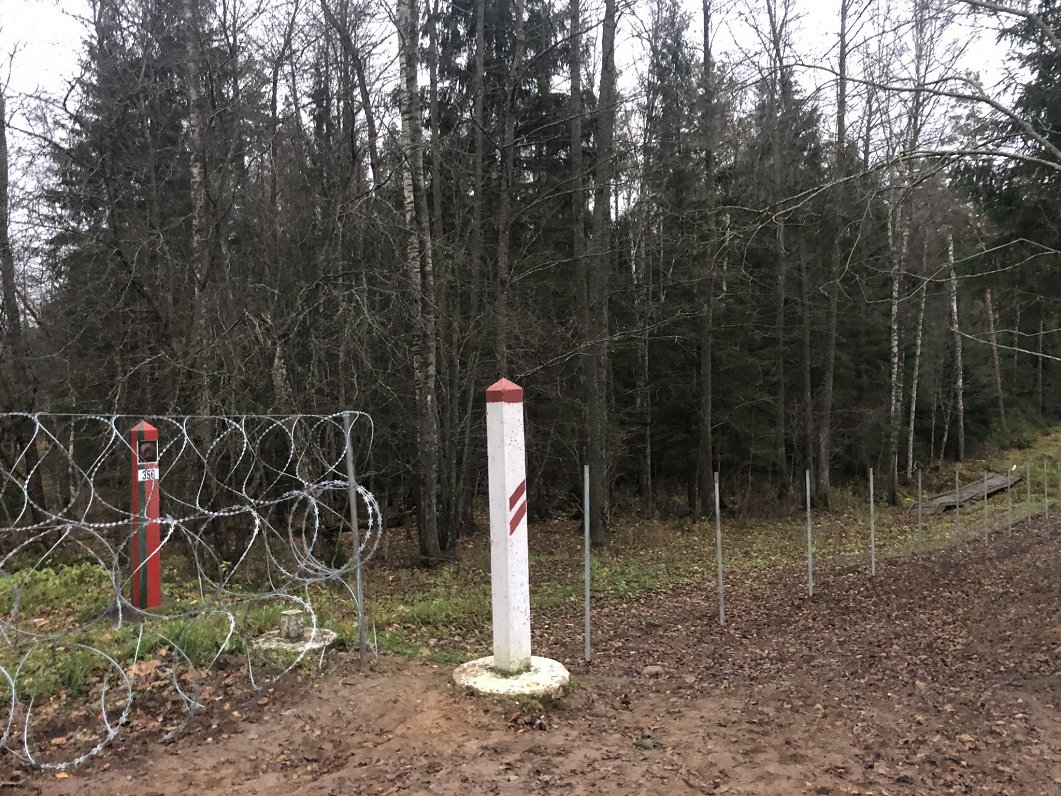Deputy Chief of the State Border Guard Daugavpils Board, Lieutenant General Juris Kusiņš says that the border is crossed in places where the fence has not yet been installed:
“The border of the Republic of Latvia-Belarus is 172.9 kilometers long. A barbed-wire fence of 25 kilometers is currently set up. So there are places where there is no barbed wire fence. In these places, [migrants] seek to cross the national border. At the moment, the fence is a very good means of preventing illegal crossings of the national border. The use of technical systems such as sensors, video surveillance, complements the whole set of protective elements.”
Kusiņš said that in places where the barbed wire fence is in place, migrants have not attempted to enter Latvia.
Asked whether he had seen wild animals get stuck in the fence, Kusiņš said: “Yes, there have been such cases. In this context, a meeting has been held with representatives of the State Border Guard Daugavpils Board and representatives of the Nature Conservation Agency and the Forest Service. A border survey was carried out and no wild animals were trapped or killed. The representatives of the Nature Conservation Agency concluded that the social media outrage was not in line with the real situation.”
Kusiņš said that Belarusian border guards are monitoring activities on the Latvian side. “Probably following the process of building the fence. Documenting it too,” he said. Belarusian border guards allegedly help Iraqi, Afghan, Iranian, Indian and other third-country nationals illegally cross the border by bringing them close and indicating where to go.
People who want to cross the border have bags with clothes, phones and food. Some say they have sold everything in their home country and go looking for happiness in Europe.
At the moment, however, people who want to cross the border illegally are returned to Belarus. On the other hand, for those who are let in and detained for humanitarian reasons, the way back to Iraq, Afghanistan, or other countries from which they have come, is organized. Primarily these are children and people who need medical treatment. The Border Guard examines each case individually.
In recent weeks there are fewer border crossings, and there are no indications of large groups that would be heading towards Latvia, the State Border Guard said. However, in view of events at the Polish border, action plans are being discussed if the situation escalates.
The association "Gribu palīdzēt bēgļiem" (I want to help refugees) has a different view: third-country nationals should be allowed to apply for the asylum seeker's procedure. Evija Strupiša, member of the association's board, said that between 20 and 24 August warm lunches and other food products were provided for those on the border. However, the border guard had said that such aid was no longer needed.
As the crisis continues, the border guard reported that such aid was no longer necessary. The association receives specific requests for needs from the State Border Guard, such as hygiene products for women, wet wipes and similar. The Red Cross provides warmer clothing.
Strupiša said that that the border offenders should be allowed to apply for the asylum seeker's procedure:
“The organization stands for us to be bound by the European Union, Universal Rights charters and other directives, which require that the person should nevertheless have access to the asylum procedure. Clearly, it is likely that not all these people are eligible for the status of an asylum seeker, followed by a residence permit, respectively, as a refugee or an alternate. However, access to this procedure should certainly be there.”
The organization would be willing to do more than the public sector, yet there is no such option. “We are prepared to support the country and these individuals to provide them with the most humane conditions possible anyway. First of all, we unanimously all urge, however, to consider allowing people to apply for the asylum seeker's procedure,” Strupiša said.




























